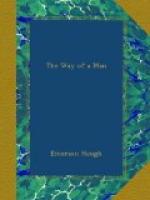“I signed that, father,” she said gently. “I was going to sign it, little by little, a letter each week. We were engaged—nothing more. But here or anywhere, some time, I intend to marry Mr. Cowles. This I have promised of my own free will. He has been both man and gentleman, father. I love him.”
I heard the groan which came from his throat. She sprang back. “What is it?” she said. The old fire of her disposition again broke out.
“What!” she cried. “You object? Listen, I will sign my name now—I will finish it—give me—give me—” She sought about on the ground for something which would leave a mark. “I say I have not been his, but will be, father—as I like, when I like—now, this very night if I choose—forever! He has done everything for me—I trust him—I know he is a man of honor, that he—” Her voice broke as she looked at my face.
“But what—what is it?” she demanded, brokenly, in her own eyes something of the horror which sat in mine. I say I see her picture now, tall, straight, sweet, her hands on her lifting bosom, eagerness and anxiety fighting on her face.
“Ellen, child, Mr. Cowles has something to tell you.”
Then some one, in a voice which sounded like mine, but was not mine, told her—told her the truth, which sounded so like a lie. Some one, myself, yet not myself, went on, cruelly, blackening all the sweet blue sky for her. Some one—I suppose it was myself, late free—felt the damp of an iron yoke upon his neck.
I saw her knees sink beneath her, but she shrank back when I would have reached out an arm as of old.
“I hate that woman!” she blazed. “Suppose she does love you—do I not love you more? Let her lose—some one must lose!” But at the next moment her anger had changed to doubt, to horror. I saw her face change, saw her hand drop to her side.
“It is not that you loved another girl,” she whispered, “but that you have deceived me—here, when I was in your power. Oh, it was not right! How could you! Oh, how could you!”
Then once more she changed. The flame of her thoroughbred soul came back to her. Her courage saved her from shame. Her face flushed, she stood straight. “I hate you!” she cried to me. “Go! I will never see you any more.”
Still the bright sun shone on. A little bird trilled in the thicket near.
CHAPTER XXXV
THE YOKE
When we started to the south on the following morning, I rode far at the rear, under guard. I recall little of our journey toward Laramie, save that after a day or two we swung out from the foothills into a short grass country, and so finally struck the steady upward sweep of a valley along which lay the great transcontinental trail. I do not know whether we traveled two days, or three, or four, since all the days seemed night to me, and all the nights were




